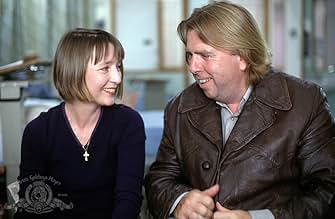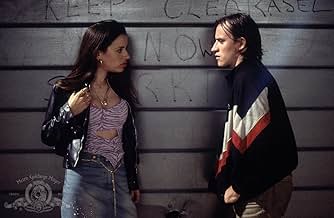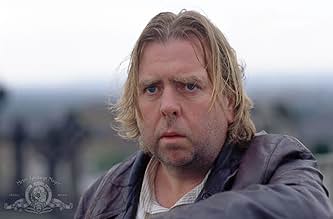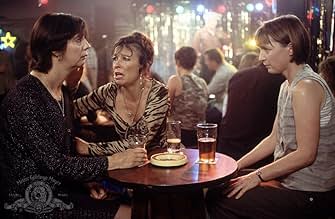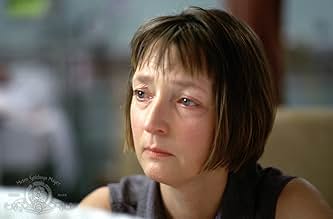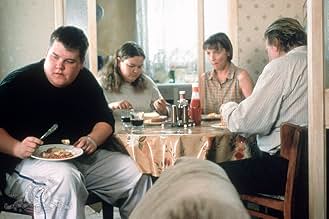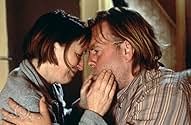AVALIAÇÃO DA IMDb
7,5/10
12 mil
SUA AVALIAÇÃO
Adicionar um enredo no seu idiomaIn a poor working class London home, Penny's love for her partner, taxi driver Phil, has run dry. When an unexpected tragedy occurs, they and their local community are brought back together.In a poor working class London home, Penny's love for her partner, taxi driver Phil, has run dry. When an unexpected tragedy occurs, they and their local community are brought back together.In a poor working class London home, Penny's love for her partner, taxi driver Phil, has run dry. When an unexpected tragedy occurs, they and their local community are brought back together.
- Direção
- Roteirista
- Artistas
- Prêmios
- 3 vitórias e 13 indicações no total
Avaliações em destaque
10tings72
Mike Leigh, in my opinion, is the greatest director ever! He needs no animations, CGI, big named stars or million dollar budgets to produce films of pure, simple genius. All or Nothing is no exception and is proving that as he ages his films have gotten better and better.
All or Nothing reminds me of life on a council estate as I remember it when I was a kid. There used to be flats on our estate that, although not the same in appearance, where practically the same in their inhabitants: the drunk family, the quiet family (Phil's and Penny's family), the druggie families, the slightly odd kid, the angry violent boyfriend, the single mum with foul-mouth daughter. They were all there. Anyone who knows life on an estate like this would wonder how Mike Leigh can put together such an accurate snapshot into the lives of these families.
Mike's films are totally captivating. To some, it might appear like nothing really happens in them, but what I see in them is a reality that is like nothing else on film. Sometimes they're funny, sometimes so almost unwatchably painful but never, ever dull or predictable.
Once you're a Mike Leigh fan you're taken to a different level. I just can't take American movies seriously anymore.
All or Nothing reminds me of life on a council estate as I remember it when I was a kid. There used to be flats on our estate that, although not the same in appearance, where practically the same in their inhabitants: the drunk family, the quiet family (Phil's and Penny's family), the druggie families, the slightly odd kid, the angry violent boyfriend, the single mum with foul-mouth daughter. They were all there. Anyone who knows life on an estate like this would wonder how Mike Leigh can put together such an accurate snapshot into the lives of these families.
Mike's films are totally captivating. To some, it might appear like nothing really happens in them, but what I see in them is a reality that is like nothing else on film. Sometimes they're funny, sometimes so almost unwatchably painful but never, ever dull or predictable.
Once you're a Mike Leigh fan you're taken to a different level. I just can't take American movies seriously anymore.
I really like this guy; he did Secrets and Lies, and Happy-Go-Lucky, and I'm about to check out "Life is Sweet." I'm on some nostalgic, vintage Britain trip. I first saw All or Nothing about 10 years ago, on cable, and came in halfway and, being an American, the times it was put on cable were about once every several years. And at the time I was in high school and didn't have my own personal computer or money to order a DVD so I just vaguely sulked missing this film. Now that I have my own means to hunt the film out I'm so glad I have! And with my trusty dusty internet I am able to see all these VHS gems I've stored over the years, like the first movies I mentioned, have the same director. So I feel I'm doing something right as far as taste, or Mike Leigh is.
The film is about a connection of lives on a council estate/public housing complex. There's a couple with two kids that are less than models and not exactly skilled office workers, and neither are the parents. It's an overweight family of care home workers, supermarket workers, cabbies, and a bone-idle brat. You get the mother who has late-night timeouts to herself to grieve her existence, and the dad who digs for loose change under the cushions his couch potato son lounges on, a scene that silently, ironically shows how the cycle of poverty will continue within this family.
Then there's the mother's friend, who is a drunk and her daughter is the council slag basically, who tries to steal the boyfriend of her mother's other friend's daughter. The daughter is Donna, a right stroppy girl who values her looks and nothing else of herself, which gives her a bad attitude that ruins her looks; the entire film she has a rough sneer on her face, or tear-stained makeup.
The film shows the stereotypes without inducing eyerolls. Just like in Secrets and Lies (an AMAZING FILM that gives you laughs and tears), the soundtrack isn't cliché rap music to add to the mood of the urban setting, but it's somber violin music and no offputting lyrics. I don't know if the violin music is done to be ironic or if it's a way to ease and appease the upper-class or older viewers who probably need a break from all the aggression. But it's a contrast and kind of makes me giggle because it's music you'd hear in a Jane Eyre miniseries, and not in a film about rough "chavs" (I hate that word, but it's an inevitable and long standing part of English society, so.)
Speaking of, then there's stuff like Daniel Mays who plays Donna's boyfriend, and his strong accent, and his entire script along with the other characters' is a rather intriguing glossary of chav slang like "doing my head in" and "bollocks" and "having a laugh"...it's endless yet not nauseating or annoying or forced. I'm not quite sure how much was ad-libbed/"mumblecore," or Mike Leigh's hand but I raised an impressed eyebrow at how Mike Leigh was able to do that, use that underclass attitude to add to the realism while making it funny without mocking them or ruining the film. So the social context of British historical and current events that create the too real contemporary "chav" culture is strong here, and Mike Leigh nicely portrays this bleak society somehow in many of his films.
My only bone to pick is the actress who plays Donna. At first it seems like she is overdoing it but I know young women really do act this way and with their mums. Plus, she is pregnant, which makes women moody sometimes, and she has every reason to be angry if you look at the very utilised backdrop of impoverished tower blocks and screaming neighbours and a horrible boyfriend. It seems the actress has to really put on this hard act and bad attitude and her incessant "Shuh-ups!" to emphasise that her character is a chav and not a "regular" London girl. It's this attitude and accent and lingo that sets "chavs" apart from others, though they are a huge part of the demographic makeup in England and other parts of Britain. So I got over it. It is a bit crazy though that when she's battered and falls pregnant does this bring her and her single mother together.
I think this lifestyle of unintelligent people was shown very intelligently. On the cable that I have it was ranked with 2 1/2 out of 4 stars. I know critics can be fickle but I was wondering why it didn't at least get 3. So perhaps the harsh setting and reality of white Brits (who are classically and mostly shown in film and art and music to be posh, upper-classed, intellectual) being shown here as the complete opposite was a hard pill to swallow and probably written off as hammed up rubbish, but no. I think it's got a skeleton of reality here under the embellishing skin of dramatic fights, and relationships, like Sally Hawkins flirting with a mentally challenged kid and how she chomps on gum the entire time and keeps flaring her nostrils. I'm not British so I don't know how many "rude girls" strut around provocatively on the estate all day, but regardless I don't think she played the role well to be honest. Someone *like* Lauren Socha perhaps, who can play chav rather naturally and endearingly.
Anyway there's nothing here that I find unrealistic as far as the households and characters within and around, nor the situations they're in, nor how most of the actors/actresses played them, albeit some over the top, and I really appreciate this tour through the other half of British real life. Fine writer/director.
The film is about a connection of lives on a council estate/public housing complex. There's a couple with two kids that are less than models and not exactly skilled office workers, and neither are the parents. It's an overweight family of care home workers, supermarket workers, cabbies, and a bone-idle brat. You get the mother who has late-night timeouts to herself to grieve her existence, and the dad who digs for loose change under the cushions his couch potato son lounges on, a scene that silently, ironically shows how the cycle of poverty will continue within this family.
Then there's the mother's friend, who is a drunk and her daughter is the council slag basically, who tries to steal the boyfriend of her mother's other friend's daughter. The daughter is Donna, a right stroppy girl who values her looks and nothing else of herself, which gives her a bad attitude that ruins her looks; the entire film she has a rough sneer on her face, or tear-stained makeup.
The film shows the stereotypes without inducing eyerolls. Just like in Secrets and Lies (an AMAZING FILM that gives you laughs and tears), the soundtrack isn't cliché rap music to add to the mood of the urban setting, but it's somber violin music and no offputting lyrics. I don't know if the violin music is done to be ironic or if it's a way to ease and appease the upper-class or older viewers who probably need a break from all the aggression. But it's a contrast and kind of makes me giggle because it's music you'd hear in a Jane Eyre miniseries, and not in a film about rough "chavs" (I hate that word, but it's an inevitable and long standing part of English society, so.)
Speaking of, then there's stuff like Daniel Mays who plays Donna's boyfriend, and his strong accent, and his entire script along with the other characters' is a rather intriguing glossary of chav slang like "doing my head in" and "bollocks" and "having a laugh"...it's endless yet not nauseating or annoying or forced. I'm not quite sure how much was ad-libbed/"mumblecore," or Mike Leigh's hand but I raised an impressed eyebrow at how Mike Leigh was able to do that, use that underclass attitude to add to the realism while making it funny without mocking them or ruining the film. So the social context of British historical and current events that create the too real contemporary "chav" culture is strong here, and Mike Leigh nicely portrays this bleak society somehow in many of his films.
My only bone to pick is the actress who plays Donna. At first it seems like she is overdoing it but I know young women really do act this way and with their mums. Plus, she is pregnant, which makes women moody sometimes, and she has every reason to be angry if you look at the very utilised backdrop of impoverished tower blocks and screaming neighbours and a horrible boyfriend. It seems the actress has to really put on this hard act and bad attitude and her incessant "Shuh-ups!" to emphasise that her character is a chav and not a "regular" London girl. It's this attitude and accent and lingo that sets "chavs" apart from others, though they are a huge part of the demographic makeup in England and other parts of Britain. So I got over it. It is a bit crazy though that when she's battered and falls pregnant does this bring her and her single mother together.
I think this lifestyle of unintelligent people was shown very intelligently. On the cable that I have it was ranked with 2 1/2 out of 4 stars. I know critics can be fickle but I was wondering why it didn't at least get 3. So perhaps the harsh setting and reality of white Brits (who are classically and mostly shown in film and art and music to be posh, upper-classed, intellectual) being shown here as the complete opposite was a hard pill to swallow and probably written off as hammed up rubbish, but no. I think it's got a skeleton of reality here under the embellishing skin of dramatic fights, and relationships, like Sally Hawkins flirting with a mentally challenged kid and how she chomps on gum the entire time and keeps flaring her nostrils. I'm not British so I don't know how many "rude girls" strut around provocatively on the estate all day, but regardless I don't think she played the role well to be honest. Someone *like* Lauren Socha perhaps, who can play chav rather naturally and endearingly.
Anyway there's nothing here that I find unrealistic as far as the households and characters within and around, nor the situations they're in, nor how most of the actors/actresses played them, albeit some over the top, and I really appreciate this tour through the other half of British real life. Fine writer/director.
Lets be honest, Mike Leigh's films are not for everyone. No effort is made to make them commercially viable, the cast are almost always, largely unknown and certain scenes are so harrowing that even the strongest viewer can find themselves distressed and perturbed. While these factors keep some people away, they also keep many others coming back time and time again. Mike Leigh is quite simply, a national treasure. And I don't mean that in the same fluffy "Gawd Bless 'Em" manner that people applied to Thora Hird and the Queen Mother. I mean that he is simply one of the finest and most honest chroniclers of contemporary Britain that we have produced.
Make no mistake, the British have always enjoyed social realism. We can gauge that through that great yardstick of social self-perceptions, the soap opera. While the Americans produce soaps full of tanned, successful oil barons and their supermodel / actress mistresses, and the Australians show us their blue collar bungalow owners who like a beer with their mates and a barbecue on Sundays, the British make soaps full of characters who are little more than diluted, softened incarnations of Leigh's own subjects. People who work at checkouts and in launderettes, people who are trapped by poverty, alcoholism, violence and stifled or strangled ambition.
But through it all , there's a hope, an anticipation of a better day just around the corner and that's what makes these films ultimately uplifting. Leigh has always shown that no matter how dire the circumstances, how forlorn the existence, love and hope, friendship and family, will find a way to offer support, comfort and succor.
In achieving this, Leigh has the assistance of another of the U.K.'s finest - Timothy Spall. If ever an actor was capable of portraying at once the fragility, insecurity and yet the potential for sheer stubborn strength of the British psyche its Spall. His character in All or Nothing, Phil is an incredibly vulnerable man. A pensive, gentle man, trapped in his own doubts and in a world of people who react by lashing out, verbally or physically and so compounding his doubts and fear. He apologises constantly, and often appears to be apologising for simply existing. An under-educated but intellectual man he even apologises for having an extensive vocabulary, a character trait which Leigh uses cleverly but subtly by having Phil precede each "big word" with "wotsitsname". It appears that Phil is searching for the word, he isn't, he knows exactly what he's about to say but is reluctant to say it in case he appears educated or articulate. We hear Phil talk about destiny and saying "It's...wotsitsname..kismet". In a world of expletives and harsh words he's ashamed at his verbal dexterity viewing it as a weakness rather than a strength.
Devices such as these help us understand technically why Leigh is just such a good writer and the way in which these devices are performed help us understand why Leigh constantly looks to Spall to anchor his scripts with his marvelous humanity.
All or Nothing is a vicious, gut wrenching, graceful, uplifting gem of a movie from a master filmmaker. Its is performed by a marvelous leading man and a collection of wonderfully talented supporting actors. In a world of blockbusters and multi million dollar opening nights Mike Leigh continues to give us humanity, despair, courage and beauty. And do we ever need him.
Make no mistake, the British have always enjoyed social realism. We can gauge that through that great yardstick of social self-perceptions, the soap opera. While the Americans produce soaps full of tanned, successful oil barons and their supermodel / actress mistresses, and the Australians show us their blue collar bungalow owners who like a beer with their mates and a barbecue on Sundays, the British make soaps full of characters who are little more than diluted, softened incarnations of Leigh's own subjects. People who work at checkouts and in launderettes, people who are trapped by poverty, alcoholism, violence and stifled or strangled ambition.
But through it all , there's a hope, an anticipation of a better day just around the corner and that's what makes these films ultimately uplifting. Leigh has always shown that no matter how dire the circumstances, how forlorn the existence, love and hope, friendship and family, will find a way to offer support, comfort and succor.
In achieving this, Leigh has the assistance of another of the U.K.'s finest - Timothy Spall. If ever an actor was capable of portraying at once the fragility, insecurity and yet the potential for sheer stubborn strength of the British psyche its Spall. His character in All or Nothing, Phil is an incredibly vulnerable man. A pensive, gentle man, trapped in his own doubts and in a world of people who react by lashing out, verbally or physically and so compounding his doubts and fear. He apologises constantly, and often appears to be apologising for simply existing. An under-educated but intellectual man he even apologises for having an extensive vocabulary, a character trait which Leigh uses cleverly but subtly by having Phil precede each "big word" with "wotsitsname". It appears that Phil is searching for the word, he isn't, he knows exactly what he's about to say but is reluctant to say it in case he appears educated or articulate. We hear Phil talk about destiny and saying "It's...wotsitsname..kismet". In a world of expletives and harsh words he's ashamed at his verbal dexterity viewing it as a weakness rather than a strength.
Devices such as these help us understand technically why Leigh is just such a good writer and the way in which these devices are performed help us understand why Leigh constantly looks to Spall to anchor his scripts with his marvelous humanity.
All or Nothing is a vicious, gut wrenching, graceful, uplifting gem of a movie from a master filmmaker. Its is performed by a marvelous leading man and a collection of wonderfully talented supporting actors. In a world of blockbusters and multi million dollar opening nights Mike Leigh continues to give us humanity, despair, courage and beauty. And do we ever need him.
This film is worth a hundred others because it is not an exercise in making a product and marketing it successfully- instead it is a statement by a man who is a true director, someone who feels passionately about the world we live in, and uses this fantastic medium to its highest potential.
The film is ultimately about a man (Phil, Timothy Spall) who has philosophized about life to the point where nothing matters to him anymore. The only thing that brings him back around the world of the living is (the only thing any of us really need for happiness)... Love.
For me, that is one of the most pertinent and beautiful things that someone with a voice in society can say.
P.S. It is highly likely that if anyone found this film 'too depressing' than they are not really primed to expect anything other than the beauty and predictability of
hollywood film. And in response to the chap who refutes the existence of such misery in the real world: you are obviously a lucky, privileged chap.
The film is ultimately about a man (Phil, Timothy Spall) who has philosophized about life to the point where nothing matters to him anymore. The only thing that brings him back around the world of the living is (the only thing any of us really need for happiness)... Love.
For me, that is one of the most pertinent and beautiful things that someone with a voice in society can say.
P.S. It is highly likely that if anyone found this film 'too depressing' than they are not really primed to expect anything other than the beauty and predictability of
hollywood film. And in response to the chap who refutes the existence of such misery in the real world: you are obviously a lucky, privileged chap.
I have just returned from a special advance showing of "All Or Nothing" at my local UGC and I must say, this film exceeded my expectations enormously.
The film is about the lives of one family in a council estate and how each member interacts with the community. The Father, Phil Bassett (Timothy Spall) works as a Taxi driver while his wife Penny (Lesley Manville) is a checkout operator at a local supermarket. They are unmarried but have two children Rachel and Rory, the former being an angst-ridden, overweight layabout who is key to the film.
Acting is superb. It is that simple. All but one performance is utterly convincing, especially Timothy Spall with his constant bemused grimace which sets the mood of both his character and the film. The one exception is Donna played by Helen Coker. Her role is played up too much and seems rather forced. Now if by any chance you're reading Helen, please don't be disheartened; I merely saw you as the "least best" of an excellent bunch and I have to criticise something!
The script is authentic, witty and full of emotion while not being repetitive (barring the word "alright"!).
"All Or Nothing" is one of the greatest portrayals of what it is REALLY like to be part of a down-on-your-luck working class family. I even believe the film ended too soon; there were a few ideas that could have been developed further. I mention this not as a criticism but as a tribute to Mike Leigh who actually made we wish this 2hr 28 minute film would go on!
Fantastic! Eight out of ten!!!
The film is about the lives of one family in a council estate and how each member interacts with the community. The Father, Phil Bassett (Timothy Spall) works as a Taxi driver while his wife Penny (Lesley Manville) is a checkout operator at a local supermarket. They are unmarried but have two children Rachel and Rory, the former being an angst-ridden, overweight layabout who is key to the film.
Acting is superb. It is that simple. All but one performance is utterly convincing, especially Timothy Spall with his constant bemused grimace which sets the mood of both his character and the film. The one exception is Donna played by Helen Coker. Her role is played up too much and seems rather forced. Now if by any chance you're reading Helen, please don't be disheartened; I merely saw you as the "least best" of an excellent bunch and I have to criticise something!
The script is authentic, witty and full of emotion while not being repetitive (barring the word "alright"!).
"All Or Nothing" is one of the greatest portrayals of what it is REALLY like to be part of a down-on-your-luck working class family. I even believe the film ended too soon; there were a few ideas that could have been developed further. I mention this not as a criticism but as a tribute to Mike Leigh who actually made we wish this 2hr 28 minute film would go on!
Fantastic! Eight out of ten!!!
Você sabia?
- CuriosidadesFirst cinema feature of Sally Hawkins.
- ConexõesFeatured in The South Bank Show: Mike Leigh (2002)
Principais escolhas
Faça login para avaliar e ver a lista de recomendações personalizadas
- How long is All or Nothing?Fornecido pela Alexa
Detalhes
- Data de lançamento
- Países de origem
- Idiomas
- Também conhecido como
- All or Nothing
- Locações de filme
- Empresas de produção
- Consulte mais créditos da empresa na IMDbPro
Bilheteria
- Orçamento
- US$ 9.000.000 (estimativa)
- Faturamento bruto nos EUA e Canadá
- US$ 201.546
- Fim de semana de estreia nos EUA e Canadá
- US$ 25.890
- 27 de out. de 2002
- Faturamento bruto mundial
- US$ 2.847.049
- Tempo de duração2 horas 8 minutos
- Cor
- Mixagem de som
- Proporção
- 1.85 : 1
Contribua para esta página
Sugerir uma alteração ou adicionar conteúdo ausente

Principal brecha
By what name was Agora ou Nunca (2002) officially released in India in English?
Responda
